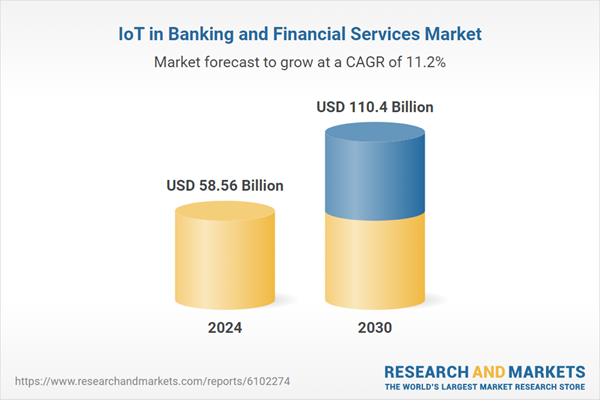Speak directly to the analyst to clarify any post sales queries you may have.
10% Free customizationThis report comes with 10% free customization, enabling you to add data that meets your specific business needs.
The adoption of IoT is largely driven by the growing demand for digital banking solutions, increasing technological sophistication, and the need for personalized financial services. Institutions are leveraging IoT to monitor ATM functionality, optimize branch operations, and reduce customer wait times. Furthermore, wearable-enabled banking and connected payments are gaining traction, helping users manage finances more intuitively. As the industry prioritizes cybersecurity and regulatory compliance, IoT is also being utilized to deliver more secure, transparent, and traceable financial environments.
Key Market Drivers
Growing Expectations for Hyper-Personalized Banking Experiences
Consumers increasingly expect tailored banking experiences, and IoT technologies are playing a pivotal role in meeting these demands. Smart devices such as wearables, mobile wallets, and voice-activated assistants provide a wealth of real-time data, including spending behavior, location, and biometric feedback. Financial institutions are capitalizing on this information to enhance customer engagement by offering real-time financial recommendations, personalized offers, and geolocation-based alerts.This high level of personalization extends into product innovation, with dynamic financial solutions such as insurance premiums and loan offers that adapt based on lifestyle and usage patterns. IoT also improves decision-making in credit scoring and fraud prevention. Pilot programs have shown that IoT-generated interactions result in higher responsiveness and engagement compared to traditional mobile banking alerts. As customers increasingly compare financial services to tech-enabled consumer experiences, institutions embracing IoT personalization stand to build stronger relationships and improve customer retention.
Key Market Challenges
Ensuring Data Privacy and Regulatory Compliance
A key challenge in this market is the need to manage large volumes of sensitive data while adhering to strict privacy laws and regulations. IoT devices across banking networks - ranging from biometric systems to mobile applications - generate complex data streams that must be securely stored and processed. Regulations such as the General Data Protection Regulation (GDPR) in Europe and the California Consumer Privacy Act (CCPA) in the U.S. impose stringent requirements for data handling, consent management, and breach notification.The dynamic and interconnected nature of IoT ecosystems makes compliance difficult, especially when third-party service providers and global data transfers are involved. Institutions must invest in advanced encryption, secure cloud storage, and policy governance tools to mitigate risk. Maintaining consistent compliance across a rapidly evolving digital infrastructure remains a top concern, particularly as regulators tighten oversight on financial data transparency and consumer rights.
Key Market Trends
Rise of Smart Branches and Connected Banking Interfaces
The emergence of smart branches is transforming the traditional banking model. Financial institutions are integrating IoT with artificial intelligence to create interactive, customer-centric environments. These branches utilize biometric recognition, intelligent kiosks, and sensor-enabled systems to streamline services, reduce wait times, and personalize customer interactions.IoT-enabled smart branches can automatically identify repeat visitors, analyze foot traffic patterns, and manage energy consumption for sustainability. In addition to operational gains, these innovations support omnichannel banking by aligning physical services with digital experiences. Enhanced surveillance and environmental control systems also improve branch security and safety. With growing competition from digital-first platforms, physical branches are evolving into tech-enabled hubs that support seamless, high-value banking interactions.
Key Market Players
- Cisco Systems, Inc.
- Microsoft Corporation
- Oracle Corporation
- IBM Corporation
- Amazon.com, Inc.
- Infosys Limited
- Accenture plc
- SAP SE
Report Scope:
In this report, the Global IoT in Banking and Financial Services Market has been segmented into the following categories, in addition to the industry trends which have also been detailed below:IoT in Banking and Financial Services Market, By Component:
- Hardware
- Software
- Services
IoT in Banking and Financial Services Market, By Application:
- Security
- Customer Experience Management
- Monitoring
- Data Management
- Others
IoT in Banking and Financial Services Market, By End Use:
- Banking
- Insurance
- Others
IoT in Banking and Financial Services Market, By Region:
- North America
- United States
- Canada
- Mexico
- Europe
- Germany
- France
- United Kingdom
- Italy
- Spain
- Asia Pacific
- China
- India
- Japan
- South Korea
- Australia
- Middle East & Africa
- Saudi Arabia
- UAE
- South Africa
- South America
- Brazil
- Colombia
- Argentina
Competitive Landscape
Company Profiles: Detailed analysis of the major companies present in the Global IoT in Banking and Financial Services Market.Available Customizations:
With the given market data, the publisher offers customizations according to a company's specific needs. The following customization options are available for the report.Company Information
- Detailed analysis and profiling of additional market players (up to five).
This product will be delivered within 1-3 business days.
Table of Contents
Companies Mentioned
- Cisco Systems, Inc.
- Microsoft Corporation
- Oracle Corporation
- IBM Corporation
- Amazon.com, Inc.
- Infosys Limited
- Accenture plc
- SAP SE
Table Information
| Report Attribute | Details |
|---|---|
| No. of Pages | 185 |
| Published | June 2025 |
| Forecast Period | 2024 - 2030 |
| Estimated Market Value ( USD | $ 58.56 Billion |
| Forecasted Market Value ( USD | $ 110.4 Billion |
| Compound Annual Growth Rate | 11.1% |
| Regions Covered | Global |
| No. of Companies Mentioned | 8 |








